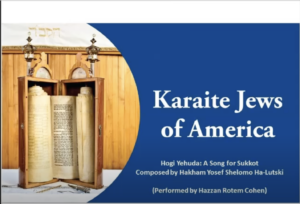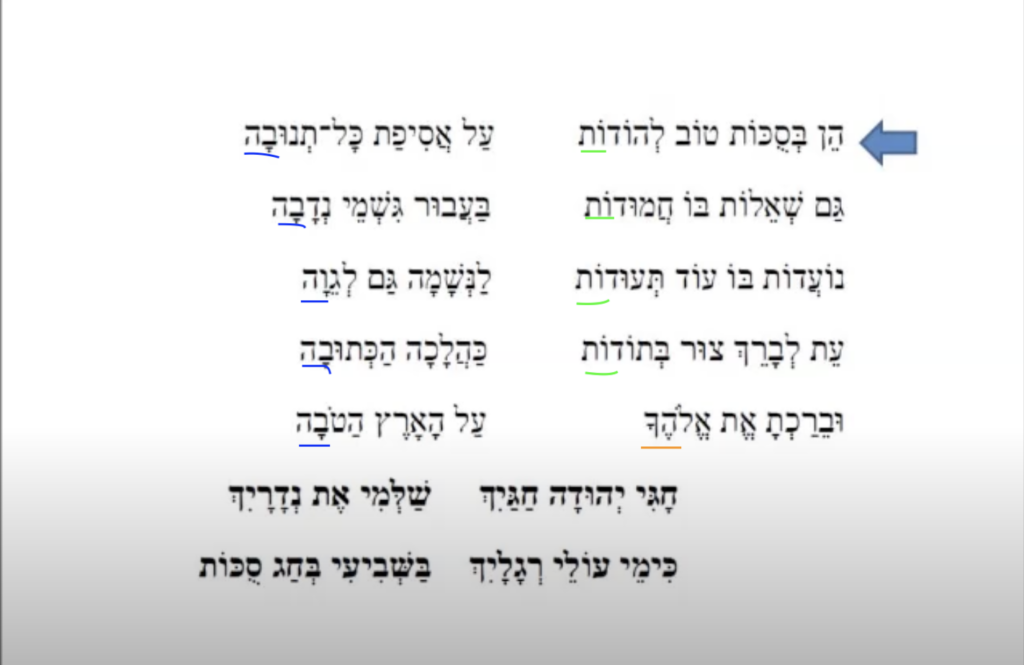 I fell in love with the song, Hag Hassukot Hazzē Lachem, during Sukkot about 12 or so years ago. I had gone to the synagogue for erev Sukkot for the first time in ages, and everyone was singing this beautiful song and pounding rhythmically on the table at the chorus. And to be honest, I felt so out of place. I didn’t even recall the song. It was one of the moments in my life when I realized I was a very educated Karaite but I had no sense of community. So I decided I’d promote the song and learn about it. I found something rather interesting along the way.
I fell in love with the song, Hag Hassukot Hazzē Lachem, during Sukkot about 12 or so years ago. I had gone to the synagogue for erev Sukkot for the first time in ages, and everyone was singing this beautiful song and pounding rhythmically on the table at the chorus. And to be honest, I felt so out of place. I didn’t even recall the song. It was one of the moments in my life when I realized I was a very educated Karaite but I had no sense of community. So I decided I’d promote the song and learn about it. I found something rather interesting along the way.
First, I asked Rotem Cohen to record the song for me – which he did in 2016, and I published online shortly thereafter.
Then I noticed that the acrostic of the poem (in this case the first letter of each stanza) reads Hag Ha-Sukkot. And I also noticed that there is one stanza after the acrostic, that begins with the letter Hē, which does not form part of the acrostic. I asked Gabriel Wasserman what I should make of this. He said it didn’t surprise him, because poems often contain stanzas beyond the acrostic – and by way of example he pointed me to the poems for the weekly Torah portion by written by H. Aaron ben Joseph.
But a few years later, I noticed that the final stanza is a bit different from the other stanzas – so different, that it seems to have been added later. Follow along and see if you can figure it out.
In short, every stanza except the last stanza ends with the word Sukkot. Having a fixed word in a stanza (in this case, the final word of the stanza), is called Millat Qeva in Hebrew. Also in every stanza except the last stanza, the first half and the second half of the lines rhyme with each other (except the line with the fixed word sukkot). See for yourself in the video and in this image here of the first stanza.

Notice how all the lines end with “-chem” except the second half of the fifth line which has our fixed word “sukkot” (in this case bassukkot). Each stanza follows this structure except the last one.
This is what the last stanza looks like – not only do the first half and second have of each line not rhyme with each other, it doesn’t have the final word “sukkot”.
Except for the fifth and final line of the stanza, the first half of each line ends with “dot”. The second half of each line including the final line ends with “va”. (The fifth line is basically a paraphrase of Deuteronomy 8:10.) I note that this stanza also appears to be written in a different meter from the other stanzas.
When I explained this at the synagogue on Shabbat during Sukkot, Abraham Massuda, the former KJA president ,immediately investigated the structure for himself and came to the same conclusion that it doesn’t seem to belong. I commended Abraham for looking into it for himself – and not taking my word.
Now, one final point – and I don’t have the evidence handy – but I was reviewing Karaite manuscripts years ago, and I found a *different* Karaite song with this chorus (the bolded lines). So it is also possible that the entire chorus was lifted from another song. I’d have to look into this very carefully, since the other song may have taken the chorus from here.
In any event, Hag Sameah, and you can download a translation of Hag Hassukkot Hazzeh Lachem here. And you can hear the Turkish melody below.


